Someone stole 500 truckloads of sand from a beach on the north shore of Jamaica. Police are using "forensic tests" on other beaches on the island to identify the thief; I'm guessing this involves a geologist looking at sand in a microscope.
This page has better images of magnified sand grains than I was able to find on Flickr, and it's a nice overview of some of the things you can learn about a beach by examining the sand... but I wanted to do my own quiz anyway. Can you match the beaches to the sand?
The beaches:
- Rehoboth Beach, Delaware
- Hollywood Beach, Florida
- Oneuli Beach, Hawaii
- Wilson Island, Queensland, Australia
- Sandwood Bay, Scotland
You can find the answers by clicking through on the sand photos - they're all tagged somewhere with the locations. Please don't look until you've guessed! It's fair game to Google for more information on the beaches, though.
I think most of you should be able to get at least two.
(Hat tip for the story: LJ Geology.)
- Log in to post comments


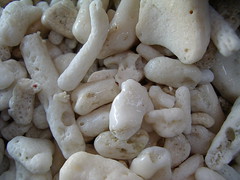


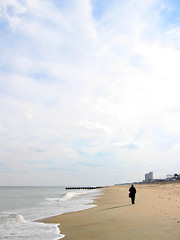
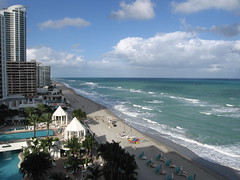
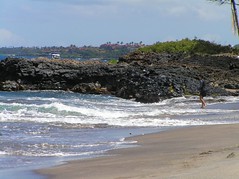
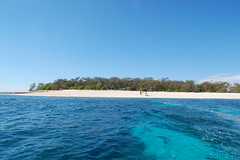


As an amateur photographer, these photos made me drool.
1. Black and red lithics, with eroded vesicles: Hawaii.
2. Delaware. Rounded, lots of quartz (but with some feldspars and lithics), good candidate for a coastal plain that collects sediment from the Appalachians.
3. Coral sand. Gotta come from a tropical beach with nearby reef. Queensland. (I would have guessed Florida, but I looked at Wilson Beach on Google Earth.)
4. Wow, look how angular those grains are! I'm betting that's a replenished beach. Hollywood Beach, Florida.
5. Lots of lithics, fairly angular, gotta be close to its source. Scotland.
1) Hawaii
2) Florida
3) Wilson Island (Australia)
4) Rehoboth
5) Scotland
1. Hawaii
2. Scotland
3. Australia
4. Florida
5. Delaware
Now I'm off to peek.
Oh and let me just say that the first image makes me think of jellybelly jelly beans.
So far, everyone agrees on 1)Hawaii and 3)Australia.
Yeah, I figured those would be the easy ones.
Both Rehoboth and Hollywood beaches have been replenished, so those are a little unfair - but Flickr only has so many Creative Commons-licensed close-ups of sand.
I got Hawaii, Rehoboth, and Hollywood. And not Scotland or Australia, which was foolish of me; I mistook the coral for eroded clamshells. A closer look would have disembarassed me of that notion, as would the colour, even adjusting for sunlight. I was in too much of a hurry.
The sand of Sandwood Bay, at least as far as the photo goes, is a close match for the sand I pick up on our local beaches in the Fraser Delta area, BC, Canada.
I managed to match the close up sand with my photo of Sandwood Bay! Thanks for using it in the company of such wonderful beaches on other continents. It is a special place, not least because of the 5 mile walk to get there from nearest road. Would be hard to steal by truck!
Love the quiz. But the Hawai`i beach photo is Little Beach, not Oneuli Beach. Oneuli is around the point, past that lava rock in the background. Above the lava rock is a pu`u [cinder cone] that contributes much of the material for Oneuli Beach. [The first photo is my photo. It's one of my favorites. I took it for my middle school students who studied some of the materials in the beaches on Maui.]
I got Hollywood and Rehoboth mixed up, even having probably spent more time on Florida beaches than almost all of the readers of this blog -- though most of that around 15 years ago...
Now I am thinking that it's not so cold there, and I should go back to, um... learn geology. Yeah.
HI
FL
QLD
DE
ST
?
You know, the sad thing about this sand theft is that there are some folks who have more sand than they know what to do with.
Great photos, great quiz! For those interested in the extraordinary world of sand, I'm writing (I admit, with a certain degree of chutzpah) to bring your attention to my book on the subject,which will be published by the University of California Press in January. "Sand- the Never-Ending Story" heralds the unsung hero that the stuff is - in our world, everyday lives and imaginations. It's definitely not a textbook, but for "popular consumption." See http://www.ucpress.edu/books/pages/10955.php
Thanks to anyone who checks it out!